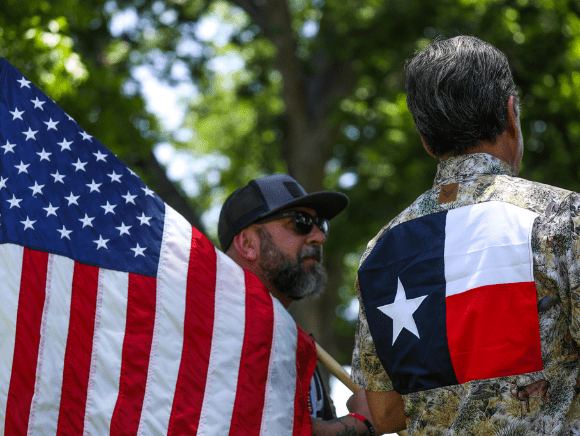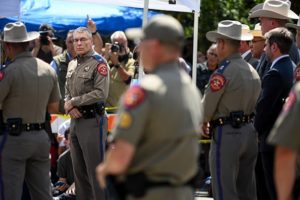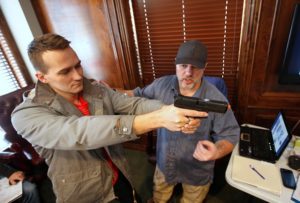
(Photo by Yasin Ozturk/Anadolu Agency via Getty Images)
Edmund Burke, an Irish-born member of the British parliament, wrote in a 1795 letter to his compatriot, William Smith, “All that is necessary for evil to triumph is for good men to do nothing.” On May 24, mothers and fathers in Uvalde, TX, witnessed the manifestation of those words in the most agonizing fashion. Though the recounting of events continues, and final conclusions should be drawn with caution, it does appear that supposedly good men did nothing and evil triumphed. One good man acted to end the horror. He did so, using the only tool suitable for a task of this nature; a gun – and if the nation is to learn anything from the slaughter of 19 children and two of their teachers, it is that there are times when the use of an instrument designed specifically to kill is, paradoxically, the only way to preserve life.
 There is something else Americans should learn from that terrible day. Not a single one of their countrymen, no matter what uniform he or she may wear professionally, has a legal obligation to place themselves in harm’s way to protect and preserve the lives of private citizens. And, as the parents of Uvalde witnessed firsthand, nor are some people, even those who swore an oath to “protect and serve,” willing to take immediate action in the face of grave danger to save lives. We have come to expect law enforcement officers to do just that, but should we? Are they obliged to sacrifice themselves for our protection? No, they are not. Thus, it is indefensible for anyone to tell those citizens they have no right to protect themselves. After Uvalde, the ‘self’ in self-defense demands fewer gun laws.
There is something else Americans should learn from that terrible day. Not a single one of their countrymen, no matter what uniform he or she may wear professionally, has a legal obligation to place themselves in harm’s way to protect and preserve the lives of private citizens. And, as the parents of Uvalde witnessed firsthand, nor are some people, even those who swore an oath to “protect and serve,” willing to take immediate action in the face of grave danger to save lives. We have come to expect law enforcement officers to do just that, but should we? Are they obliged to sacrifice themselves for our protection? No, they are not. Thus, it is indefensible for anyone to tell those citizens they have no right to protect themselves. After Uvalde, the ‘self’ in self-defense demands fewer gun laws.
On Tuesday, outside that school, parents did not merely stand around, waiting for the police to rescue their children. They were themselves willing to enter the school and do what was necessary to protect their own. One mother managed to do just that but other parents were physically prevented by the police from going into the school. While police officers cannot be expected to put their own lives on the line, it is unsettling, to say the least, that they would take action against private citizens attempting to save their own children. The state may not have an obligation to protect but it should not have the power to prevent people from protecting themselves and their loved ones.
No Right to Expect Protection
In 1989, The Supreme Court ruled in the case of DeShaney v. Winnebago Cty. Without going into the details of the case, which had nothing to do with gun rights, it is worth noting that the primary holding, the main gist of the Court’s decision, was that the state (government) has no obligation to intervene to protect citizens from the actions of private parties – to protect citizens from a danger that it (the state) played no part in creating. The suggestion, then, that carrying a firearm for self-defense is unnecessary because we have police is both legally and morally a false and flawed perspective.

Texas Department of Public Safety Director and Colonel Steven C. McCraw (Photo by Joshua Lott/The Washington Post via Getty Images)
Is it fair to suggest that the most fundamental right any human being possesses is the right to keep himself or herself from harm? No rational humanitarian would argue that it is not. How many Americans, regardless of race, skin color, political persuasion, or religion, would say they do not have the basic right to avoid danger wherever and whenever possible – and to take whatever action is necessary to preserve their own bodies and lives if physically attacked? It is almost certain that none would say so, not even the most zealous anti-gun progressive.
Such an individual may argue the need for self-defense is rendered unnecessary by the existence of law enforcement agencies. The Uvalde massacre has clearly demonstrated the flaw in this idea. Though the first police officers arrived at Robb Elementary School just minutes after the shooter entered the building, more than one hour and 15 minutes passed until an officer from a Border Patrol tactical team directly engaged and killed the murderer. Twenty-one lives were snuffed out in the intervening time despite the presence of multiple members of those law enforcement agencies supposedly capable of protecting us so that we do not have to protect ourselves.
But the hand-wringing over this and every other mass shooting is also rather disingenuous. The media saturation to which these events are subjected disregards the fact that thousands of Americans are murdered every year – relatively few of them in mass casualty shootings. It also ignores the hundreds of thousands of times every year a firearm is used defensively. As the Heritage Foundation notes:
“According to the Centers for Disease Control and Prevention, almost every major study on defensive gun use has found that Americans use their firearms defensively between 500,000 and 3 million times each year. There’s good reason to believe that most defensive gun uses are never reported to law enforcement, much less picked up by local or national media outlets.”
While it is of course impossible to quantify the lives saved as a result of defensive gun use, simply going by even the lowest estimate of how many times it happens, one can reasonably suggest that guns save at least as many lives every year as they take.
A Conditional Constitutional Right?
Of all the rights guaranteed – not granted, but preserved – by the US Constitution, that which is described in the 2nd Amendment is unique. It is the one right honored only with conditions and many exceptions. It is the one right that most elected officials have come to regard as a privilege – the exercise of which is permitted, though not to everyone and not all the time – as opposed to a natural right.
After many decades of regulation, conditions, stigmatism, and negative press, carrying a gun in public – if not owning one – is a practice in which relatively few Americans indulge. Data suggest that less than nine percent of Americans have a concealed carry permit. Even factoring in the number of states that observe constitutional carry or permitless carry, now 24, the number of people walking the streets, legally, with a firearm is quite small. It is likely that most people, during the course of an average month, will not cross paths with someone who is armed. Add to that the fact that many buildings, such as government offices and schools, as well as a lot of private businesses, sporting venues, and transportation systems prohibit the carrying of guns and we find ourselves in an environment that is, for the most part, gun-free.

(Photo by George Frey/Getty Images)
By most estimates, there are anywhere between 390 million and 430 million firearms in the United States. The number of illegally owned guns is not known. The overwhelming majority of Americans do not carry guns in public and, according to data from the Pew Research Center – more or less corroborated by several other studies – more than 60% of Americans do not even own a gun. Still, an individual’s safety is legally guaranteed by nobody. Carrying a firearm or being in the presence of other responsible armed citizens is, quite literally, the best and only assurance one has that, if confronted by one or more individuals, intent upon murder, one might live to talk about it.
The only way to prevent more public massacres, then – and it is the only way – is for a greater number of responsible Americans to carry guns, and for schools and other public venues to discard the delusional notion that prohibiting firearms will stop evil people from using them.
In the wake of Uvalde, a lot of politicians – including establishment go-along-to-get-along Republicans like Senate Minority Leader Mitch McConnell (R-KY) – are mulling new gun laws. The left has for decades devoted itself to stripping Americans of their right to self-defense, as confirmed by the Supreme Court. What manner of government official is it that believes ordinary people have no right to assure their own safety? As for McConnell and whoever else in his party is willing, for the sake of signaling their virtue, to buckle under pressure and deprive law-abiding Americans of their rights, let us for a moment assume that these Republicans are, in fact, good people – and let us remember what Edmund Burke had to say about that.
Remember to check out the web’s best conservative news aggregator
Whatfinger.com — the #1 Alternative to the Drudge

